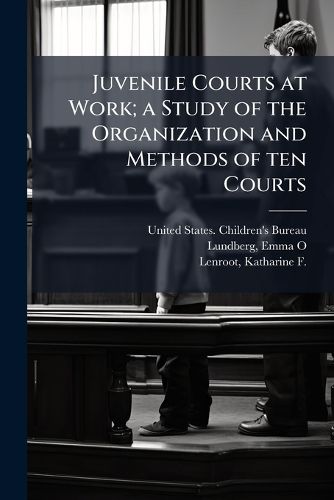Readings Newsletter
Become a Readings Member to make your shopping experience even easier.
Sign in or sign up for free!
You’re not far away from qualifying for FREE standard shipping within Australia
You’ve qualified for FREE standard shipping within Australia
The cart is loading…






"Juvenile Courts at Work" offers a detailed examination of the organization and methodologies employed by ten juvenile courts in the early 20th century United States. Conducted under the auspices of the United States Children's Bureau, and authored by Emma O. Lundberg and Katharine F. Lenroot, this study provides invaluable insights into the nascent stages of the juvenile justice system. The work delves into the practical aspects of court operations, exploring the approaches taken in addressing juvenile delinquency and child welfare. This historical document is a crucial resource for those interested in the evolution of legal and social responses to young offenders and children in need, offering a window into the challenges and innovations of its time.
This work has been selected by scholars as being culturally important, and is part of the knowledge base of civilization as we know it. This work was reproduced from the original artifact, and remains as true to the original work as possible. Therefore, you will see the original copyright references, library stamps (as most of these works have been housed in our most important libraries around the world), and other notations in the work.
This work is in the public domain in the United States of America, and possibly other nations. Within the United States, you may freely copy and distribute this work, as no entity (individual or corporate) has a copyright on the body of the work.
As a reproduction of a historical artifact, this work may contain missing or blurred pages, poor pictures, errant marks, etc. Scholars believe, and we concur, that this work is important enough to be preserved, reproduced, and made generally available to the public. We appreciate your support of the preservation process, and thank you for being an important part of keeping this knowledge alive and relevant.
$9.00 standard shipping within Australia
FREE standard shipping within Australia for orders over $100.00
Express & International shipping calculated at checkout
"Juvenile Courts at Work" offers a detailed examination of the organization and methodologies employed by ten juvenile courts in the early 20th century United States. Conducted under the auspices of the United States Children's Bureau, and authored by Emma O. Lundberg and Katharine F. Lenroot, this study provides invaluable insights into the nascent stages of the juvenile justice system. The work delves into the practical aspects of court operations, exploring the approaches taken in addressing juvenile delinquency and child welfare. This historical document is a crucial resource for those interested in the evolution of legal and social responses to young offenders and children in need, offering a window into the challenges and innovations of its time.
This work has been selected by scholars as being culturally important, and is part of the knowledge base of civilization as we know it. This work was reproduced from the original artifact, and remains as true to the original work as possible. Therefore, you will see the original copyright references, library stamps (as most of these works have been housed in our most important libraries around the world), and other notations in the work.
This work is in the public domain in the United States of America, and possibly other nations. Within the United States, you may freely copy and distribute this work, as no entity (individual or corporate) has a copyright on the body of the work.
As a reproduction of a historical artifact, this work may contain missing or blurred pages, poor pictures, errant marks, etc. Scholars believe, and we concur, that this work is important enough to be preserved, reproduced, and made generally available to the public. We appreciate your support of the preservation process, and thank you for being an important part of keeping this knowledge alive and relevant.